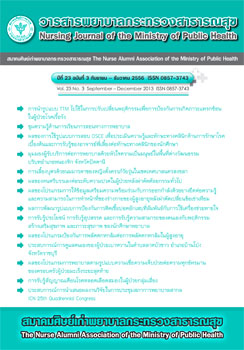ผลของโปรแกรมการพยาบาลตามรูปแบบความเชื่อความเจ็บป่วยต่อความ ทุกข์ทรมานของครอบครัวผู้ป่วยมะเร็งระยะสุดท้าย
Main Article Content
Abstract
การวิจัยครั้งนี้เป็นการวิจัยกึ่งทดลอง มีวัตถุประสงค์เพื่อศึกษาผลของโปรแกรมการพยาบาลตามรูปแบบ ความเชื่อความเจ็บป่วยต่อความทุกข์ทรมานของครอบครัวผู้ป่วยมะเร็งระยะสุดท้าย กลุ่มตัวอย่างเป็นครอบครัว ผู้ป่วยมะเร็งระยะสุดท้ายที่อาศัยอยู่ในจังหวัดชลบุรี จำนวน 20 ครอบครัว เลือกกลุ่มตัวอย่างด้วยวิธีการสุ่ม ตัวอย่างแบบอย่างง่าย และสุ่มเลือกเข้ากลุ่มทดลองและกลุ่มควบคุม กลุ่มละ 10 ครอบครัว กลุ่มทดลองได้รับ โปรแกรมการพยาบาลตามรูปแบบความเชื่อความเจ็บป่วย ส่วนกลุ่มควบคุมได้รับการดูแลตามรูปแบบปกติ ทั้งกลุ่มทดลองและกลุ่มควบคุมได้รับการประเมินความทุกข์ทรมานก่อนและหลังได้รับโปรแกรมโดยใช้แบบ สัมภาษณ์ความทุกข์ทรมานของครอบครัว วิเคราะห์ข้อมูลด้วยสถิติพรรณนาและการทดสอบด้วย Wilcoxon Signed-Ranks test และ Mann Whitney U test ผลการวิจัยพบว่า เมื่อเปรียบเทียบกับกลุ่มที่ได้รับการดูแลตาม รูปแบบปกติ ครอบครัวของกลุ่มที่ได้รับโปรแกรมการพยาบาลตามรูปแบบความเชื่อความเจ็บป่วยมีความทุกข์ ทรมานน้อยกว่า อย่างมีนัยสำคัญทางสถิติ (U = 100, p < .01) และยังมีความทุกข์ทรมานน้อยลงกว่าเมื่อเทียบกับ ก่อนได้รับโปรแกรมการพยาบาลตามรูปแบบความเชื่อความเจ็บป่วย อย่างมีนัยสำคัญทางสถิติ (Wilcoxon Signed-Ranks test=55, p<.01) ผลการวิจัยนี้แสดงให้เห็นว่าโปรแกรมการพยาบาลตามรูปแบบความเชื่อความ เจ็บป่วยลดความทุกข์ทรมานในครอบครัวได้และสามารถนำไปประยุกต์ใช้ในการดูแลครอบครัวผู้ป่วยเพื่อช่วยลด ความทุกข์ทรมานได้
Effect of Illness Beliefs Model Program on the Families Suffering From Taking Care End State Cancer Patients
Suriya Fongkerd*
Sroungtip Poogritsana*
Abstract
The purpose of this quasi - experimental research was to determine the effect of applying Illness Beliefs Model on family suffering from taking care of the end stage cancer patients. The sample consisted of 20 families and randomly assigned to the control and experimental groups each of 10 families. The control group received regular program and the experimental group received the applying Illness Beliefs Model (IBM) program. The sample in both group were assessed for suffering at a baseline level and six weeks after the experiment. Data were analyzed using frequency, median, standard deviation, Wilcoxon Signed-Ranks test and Mann Whitney-U test. The results revealed that the median score of family suffering in the experimental group was significantly less than those in the control group (U = 100, p < .01). Compared to the baseline, score of family suffering was lower at the end of the experiment for the experimental group (Wilcoxon Signed-Ranks test=55, p<.01). Findings suggested that effect of the Illness Beliefs Model program could reduce the families suffering from taking care of the end stage cancer patients. The registered nurses should consider applying the Illness Beliefs Model program to families with patients having the end stage cancer.
* Instructor of Borommarajonani College of Nursing Chon Buri
Article Details
บทความและรายงานวิจัยในวารสารพยาบาลกระทรวงสาธารณสุข เป็นความคิดเห็นของ ผู้เขียน มิใช่ของคณะผู้จัดทำ และมิใช่ความรับผิดชอบของสมาคมศิษย์เก่าพยาบาลกระทรวงสาธารณสุข ซึ่งสามารถนำไปอ้างอิงได้

